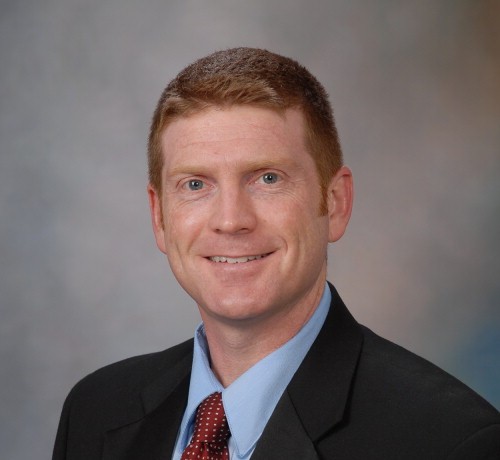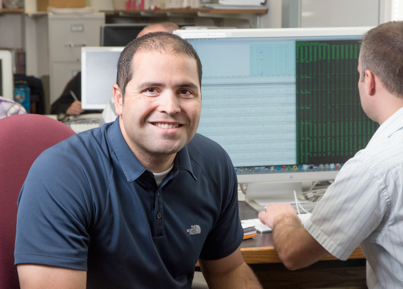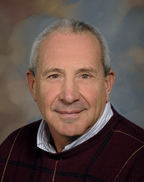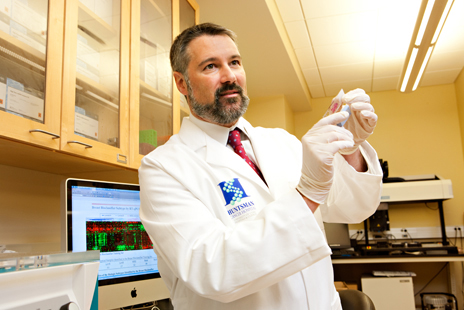Standing on the Shoulders of Giants
John D. Fryer
Affiliation: Mayo Clinic, Neuroscience Department
Primary Research: Alzheimer's disease & brain inflammation
Capacity: Senior faculty mentor
Dr. John Fryer is a highly-recognized molecular biologist in Alzheimer’s disease, who has been highly successful throughout his career. Dr. Fryer employs cutting-edge approaches, including long-read sequencing, single-cell sequencing, and various additional wet-lab approaches to better understand disease at the molecular level. He has been well funded for many years. While Dr. Fryer has many accolades to tout, what makes him truly special is the genuine care he gives his trainees. Dr. Fryer goes above and beyond to help them in any way he can—at times at great sacrifice. I have often told people that there may be other mentors as great as Dr. Fryer, but I don't believe you can find anyone better. I simply could not have accomplished what I have accomplished without Dr. Fryer.
Contribution
Dr. Fryer recruited me to the Mayo Clinic as a junior faculty member in his lab in 2016, and gave me the freedom to explore and realize my ideas. He was genuinely excited to see me further develop as a scientist, and to develop my ideas. He also provided invaluable insights on grant writing. During my four years working with Dr. Fryer, I have contributed to 11 scientific papers in well-respected journals, and obtained nearly $5,000,000 in funding. I would not be where I am today without Dr. Fryer. On more than one occasion, I have commented to Dr. Fryer that I wish I could repay him for what he has done for me; without hesitation, he has always replied, saying: "the best way to repay me is to pay it forward [to your trainees]." This has become a primary goal for me as I begin to train new students.
Fryer Lab

John "Keoni" Kauwe
Affiliation: Brigham Young University, Department of Biology
Primary Research: Alzheimer's disease genetics
Capacity: Ph.D. Advisor
Dr. Kauwe is an internationally recognized researcher in Alzheimer’s disease genetics with over 80 peer-reviewed publications and more than $2.5 million dollars in research grants. His research, which focuses on innovative approaches to characterize the genetic architecture of Alzheimer’s disease, is funded by grants from the NIH National Institute on Aging, the Alzheimer’s Association, the Charleston Conference on Alzheimer’s disease and partnerships with other organizations. He has made important contributions towards discovering more than a dozen new genetic risk factors for Alzheimer’s disease, resulting in publications in top journals such as The New England Journal of Medicine, Nature, Nature Genetics, Neuron, Neurology, and Proceedings of the National Academy of Sciences. Dr. Kauwe’s work has been recognized nationally and internationally as evidenced by his appointment as a senior editor for the journal Alzheimer’s & Dementia, his recent service as a panelist for the NIH Summit on Alzheimer’s disease Research, and as the scientific lead for the international Alzheimer’s disease DREAM Challenge. He is: the most interesting man in the world.
Contribution
Dr. Kauwe has been a remarkable mentor. Under his mentorship, I have published 16 papers, including 2 high-profile papers on epistasis in Alzheimer’s disease (Biological Psychiatry and Alzheimer's and Dementia). Not only has Dr. Kauwe greatly refined my scientific prowess, but he has taught me invaluable principles on keys to success.
Kauwe LabJulio Cesar Facelli
Affiliation: University of Utah, Department of Biomedical Informatics
Primary Research: Parallel and Distributed Computing
Capacity: M.S. Advisor
Dr. Facelli is currently Professor and Vice Chair of the Department of Biomedical Informatics at the University of Utah, Director of Biomedical Informatics at the Center for Clinical and Translational Science, an Adjunct Professor of Chemistry and Physics, and member of the Institute for Clean and Safe Energy and the Utah Nano Science Institutes. Dr. Facelli was elected fellow of the American College of Medical Informatics (ACMI) in 2014. Dr. Facelli researches advanced computing techniques to solve important problems in the biomedical domain. As my M.S. advisor, we worked developed a sophisticated algorithm (paper) to: (1) characterize intrinsic error (natural variation) in complex multi-variate clinical assays, and (2) create personalized confidence scores for a patient's clinical result, providing critical information to health-care professionals. He's one of the friendliest people you'll ever meet.
Contribution
Working with Dr. Facelli was a true pleasure—mentoring at it's finest. Under his tutelage I learned what a well-written paper looks like and honed advanced statistical approaches to complex biomedical problems.
Facelli Lab

Philip S. Bernard
Affiliation: University of Utah, Huntsman Cancer Institute
Primary Research: Translational research in cancer
Capacity: Medical Director and Principal Investigator
Philip Bernard, MD, is an associate professor of pathology at the University of Utah School of Medicine, medical director of Molecular Oncology Diagnostics at ARUP Laboratories, and a Huntsman Cancer Institute investigator. Dr. Bernard's research focuses on molecular classifications of tumors for the prognosis and treatment of cancer. This includes predicting response to therapy and monitoring residual disease. Using cutting-edge technology such as microarray, real-time polymerase chain reaction, and laser-capture microdissection, his lab correlates clinical behavior of tumors with molecular features. Working with Dr. Philip Bernard and other field-leading researchers, I helped develop the PAM50 Breast Tumor Bioclassifier at ARUP Laboratories and the Huntsman Cancer Institute, and transition it into the clinical setting. The PAM50 is now licensed to nanoString Technologies and branded as Prosigna.
Contribution
Working with Dr. Bernard elevated my aspirations, expanded my scientific creativity, and grew my ability to design and execute complex research in a fast-paced, mission-critical environment. I learned what field-altering research looks like, and what it takes to accomplish it. Working with Dr. Bernard, I published 10 papers, including the PAM50 Breast Cancer Assay. I owe a lot to his mentoring.
Bernard LabLeon and Vicki Ebbert
Affiliation: Ebbert CPA
Primary work: Accounting
Capacity: Dedicated parents
My parents have been a fount of inspiration throughout my life and education. They continue to teach me precious life lessons as they support and encourage me. As a child, my mother wondered whether she would ever get me through high school successfully, since my educational interests were somewhat lacking. Throughout those unsettling years, my parents showed extraordinary patience by continually encouraging me to perform my best and not to settle for less. My educational interests awoke later in life, though I struggled to develop intellectually. I found strength in a principle my father taught: “persistence will prevail.” That is a valuable lesson that persistence can overcome nearly any obstacle.
Contribution
My parents taught me loyalty, persistance, and helped me develop my faith.
